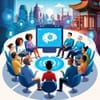The conversation around AI often revolves around its potential to revolutionize industries and improve lives, but it's equally important to consider the human side of AI. As we build and interact with AI systems, we're not just creating tools – we're shaping the future of human connection and experience. Human connection is essential to our well-being and happiness, and while AI can augment human connection, it can't replace it. We need to prioritize building AI systems that foster meaningful relationships between humans.
AI can be a powerful tool for detection and diagnosis in various fields, from healthcare to finance. However, AI systems are only as good as the data they're trained on, and biases in the data can lead to flawed results. To ensure that AI systems are effective and fair, we need to design and train them to minimize biases and maximize accuracy.
As we build AI systems, we need to consider the potential consequences of our creations. We need to prioritize transparency, accountability, and fairness in AI development. By working together, we can build AI systems that augment human capabilities and promote a better future for all. This requires a thoughtful and intentional approach to AI development, one that balances the potential benefits of AI with the need to protect human values and relationships.
Ultimately, the future of AI is not just about technology – it's about the kind of world we want to create. By prioritizing human connection, fairness, and accountability in AI development, we can build a future that is more equitable, more compassionate, and more human.


